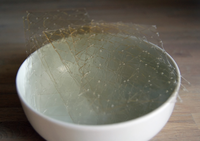
Photo from wikipedia
Abstract The work in this article was done to evaluate the performance of new protein-based bioactive compounds for treating the cancer cells. These bioactive compounds were synthesized by condensation reaction… Click to show full abstract
Abstract The work in this article was done to evaluate the performance of new protein-based bioactive compounds for treating the cancer cells. These bioactive compounds were synthesized by condensation reaction of sodium caseinate with amino acids in absence of solvent and evidenced by FTIR, TGA and DSC analyses. The bioactivity of these protein-based conjugates (SC-conjugates), was evaluated towards different cancer cell lines such as Breast MCF7, Colon HCT116, Lung A549 and Human hepatocellular carcinoma HePG2) in comparison with sodium carboxymethyl cellulose-amino acid SCMC-conjugates. Two types of amino acids (phenylalanine and methionine) were used to evaluate the role of phenyl group contained in the amino acid on bioactivity performance. The effective role and safety behavior of the conjugates were assessed from the values of selectivity index against RPE1 [normal retina cell line], moreover their cancer inhibition versus natural extracted flavonoids whether individually or in hybrid. The results showed the effective performance of SC-PA conjugate in inhibiting the cancer cell proliferation, of most examined cancer cell lines, especially against breast cancer MCF7 and colon HCT116 (IC50 and IC90 are 39.8–44.1 μg/mL and 71.7–83.6 μg/mL, respectively). IC50 of this conjugate for MCF7 was equivalent to Rutin natural flavonoid. The Rutin has synergistic inhibition effect to MCF7 when it used in hybrid with SC-PA, at which it leads to decrease the IC50 from 39.8 to 33.1 μg/mL.
Journal Title: Journal of Drug Delivery Science and Technology
Year Published: 2020
Link to full text (if available)
Share on Social Media: Sign Up to like & get
recommendations!